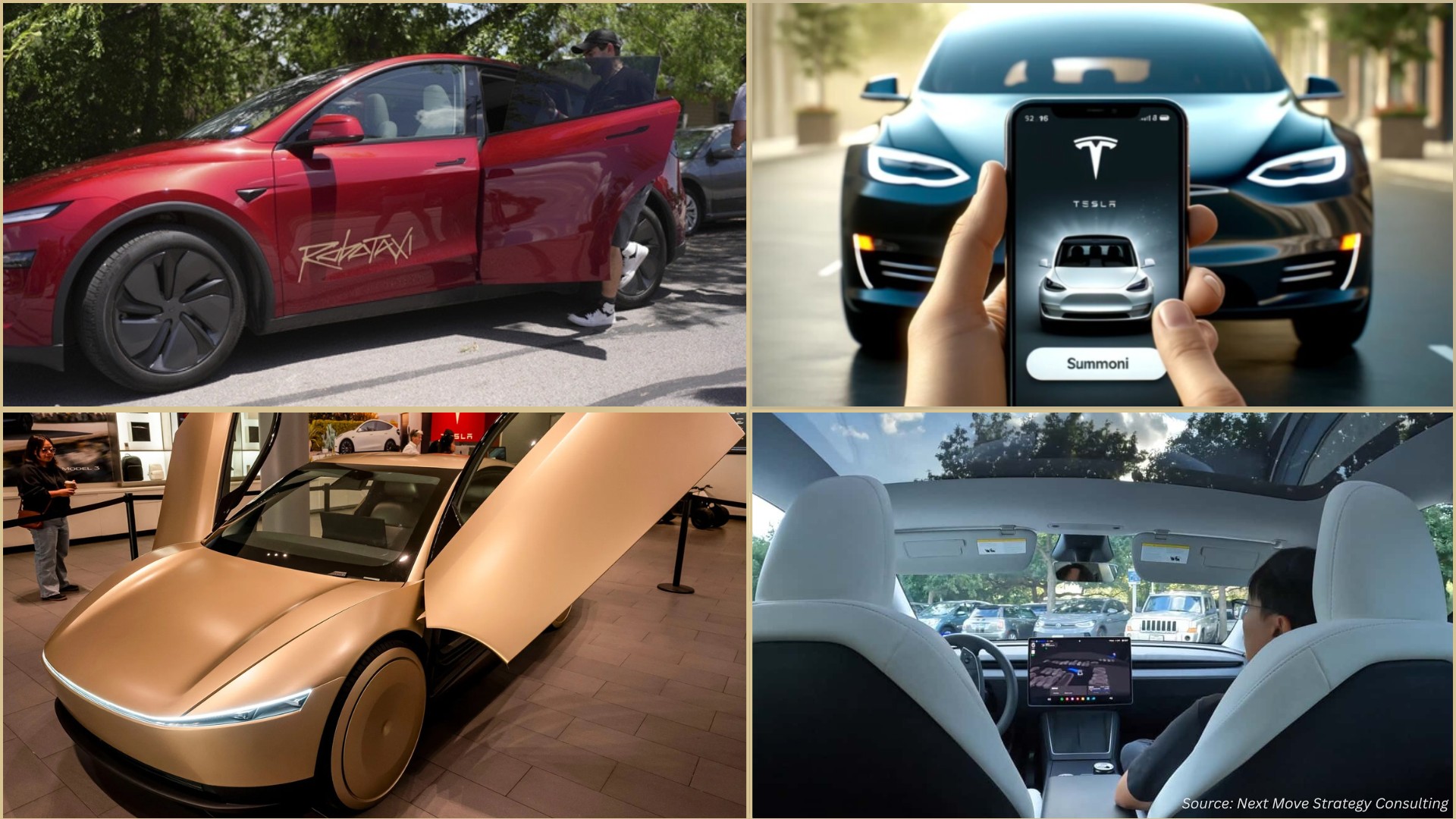
Automotive Digital Key Market by Component (Hardware, Software, Services), by Technology & Protocol (NFC, and Others), by Key Form Factor (Smartphone, Key Fob, and others), by Access Method (Passive Entry/Passive Start (PEPS), and Others), By Vehicle Type (Passenger Vehicles, and Others), By Technology Standard (Digital Key Release 1.0, and Others), By Sales Channel (OEM, and Others), and Others – Global Opportunity Analysis and Industry Forecast, 2025 – 2030.
Industry Overview
The global Automotive Digital Key Market size is estimated at USD 4.63 billion in 2024 and is expected to be valued at USD 5.64 billion by the end of 2025. The industry is projected to grow, reaching USD 15.25 billion by 2030, with a CAGR of 22.1% between 2025 and 2030.
The market is witnessing robust growth, driven by the global shift toward electrification, connectivity, and smart mobility. With over 17 million EVs sold in 2024 and rising adoption of IoT and smart devices, consumers are demanding seamless, secure, and integrated vehicle access solutions. Digital keys enabled via smartphones, wearables, and cloud platforms are becoming a vital component of connected vehicles, especially as autonomous driving gains traction.
However, concerns over hacking and signal-relay attacks pose adoption challenges, prompting increased investment in cybersecurity. As the industry pivots to autonomous and shared mobility models, digital keys are poised to become foundational in next-gen vehicle access ecosystems.
Moreover, top players such as Robert Bosch GmbH, Continental AG, DENSO Corporation, etc. are adoption initiatives such as product launches in order to stay in competition. As the automotive sector increasingly emphasizes connectivity and smart systems digital car key continue to revolutionize vehicle access and management.
The Rising Demand for Electric Vehicles Boosts the Market Growth
The global surge in electric vehicle sales is significantly boosting the automotive digital key market demand, as consumers increasingly prioritize seamless, secure, and connected access solutions. According to the International Energy Agency (IEA), EV sales surpassed 17 million units in 2024, up over 25% from 2023, with projections exceeding 20 million by 2025, accounting for nearly 25% of all new car sales.
China alone led this surge, selling approximately 11 million EVs in 2024, a volume equal to total global EV sales in 2022 with BEVs comprising nearly half of all new car sales sold in the country. This continued expansion drives demand for advanced digital key systems, such as keyless entry, remote lock/unlock, and digital wallet integration, aligning with EV buyers' expectations for security, convenience, and connectivity.
Rising Adoption of IoT Technology Drives Market Demand Growth
The rapid expansion of Internet of Things (IoT) technologies is fueling the automotive digital key market growth, as consumers increasingly expect truly connected vehicles. For instance, cellular IoT subscriptions reached approximately 4 billion by the end of 2024, representing around 21% of total IoT connections, and are forecasted to exceed 7 billion by 2030.
This surge in connectivity enables seamless vehicle access, such as smartphone-based unlocking and engine start, eliminating traditional keys and enhancing convenience and security. As IoT adoption continues its upward trajectory, demand for advanced digital car key solutions is becoming an essential component of modern automotive ecosystems.
The Growing Adoption of Smart Devices is Driving the Market Growth
Global smartphone and wearable adoption are accelerating the uptake of automotive digital keys, as users demand seamless, secure vehicle access without traditional keys. By the end of 2023, around 5.6 billion people, equivalent to 69% of the global population subscribed to mobile services, supported by 4.7 billion mobile internet users, and this share is expected to grow to 6.3 billion by 2030.
Moreover, there were 8.9 billion mobile‐cellular subscriptions in 2023, already surpassing the global population. This proliferation of connected devices underscores consumer expectations for smartphone and wearable-based vehicle access unlocking, starting, and personalizing cars boosting demand for advanced digital car key solutions in the automotive sector.
Security Concerns Related to Automotive Digital Key Restricts Market Growth
Security risks surrounding automotive digital keys, such as hacking, signal relaying, and unauthorized remote access are significantly inhibiting consumer trust and market expansion. Studies show that 99% of tested keyless vehicles were vulnerable to relay attack-based entry, and prominent breaches including the 2024 Kia web portal hack and a firmware exploit in Tesla vehicles highlight how attackers can unlock, start, and track cars remotely. These ongoing threats are dampening adoption rates and forcing manufacturers to invest heavily in encryption, rolling codes, multi factor authentication, and regulatory compliance to restore confidence.
Introduction of Autonomous Vehicles Creates Future Opportunity
The rise of autonomous vehicles presents a significant growth opportunity for automotive digital keys, as self-driving fleets, such as Volkswagen’s upcoming robotaxi and Uber’s driverless shuttles launching in the U.S. and Europe demand secure, user-friendly access systems that no longer rely on conventional keys.
Advanced digital-key platforms featuring cloud authentication, biometric ID, and smartphone control align perfectly with the needs of autonomous and shared-mobility models, enabling seamless entry and enhanced security in multi-user environments. As autonomy reshapes personal and commercial transport, demand for robust, smart vehicle access solutions will only accelerate with time.
Market Segmentations and Scope of the Study
The automotive digital key market report is segmented on the basis of component, connectivity technology, key type, vehicle type, technology generation, functionality, sales channel, application and region. On the basis of component type, the market is segmented into hardware and software. On the basis of connectivity technology, the market is divided into communication protocols, and access & authentication technologies. On the basis of key type, the market is classified into physical keys and mobile-based keys. On the basis of vehicle type, the market is divided into passenger and commercial vehicles. On the basis of technology generation, the market is classified into 1st, 2nd, 3rd and 4th generation. On the basis of functionality, the market is divided into single and multi-function keys. On the basis of sales channel, the market is divided into OEMs and the aftermarket. On the basis of application, the market is classified into fleet management, shared mobility services, and others. The regional breakdown includes regions such as North America, Europe, Asia-Pacific, and the Rest of the World (RoW).
Geographical Analysis
North America currently leads the automotive digital key market share and is expected to maintain its dominance. According to the IEA, Canada's electric vehicle (EV) sales surged from approximately 130,000 BEVs in 2022 to around 171,000 in 2023, a 31% increase. In the United States, mobile connectivity is extremely high, with 112.4 mobile cellular subscriptions per 100 people in 2023, up from 108.8 in 2022. This combination of rising EV adoption and near-universal smartphone penetration is fueling market demand for smart, secure digital car keys that are seamlessly integrated into mobile ecosystems.
Europe is showing strong growth, driven by a thriving luxury car market in Germany, the UK, and Sweden. Innovations such as BMW's deployment of Digital Key Plus (UWB + NFC) in its 2024 models and Mercedes-Benz’s adoption of secure Qualcomm-based digital keys highlight the region’s technological leadership. Similarly, Continental’s AllGuard platform, now embedded in over 2 million vehicles worldwide, maintains a significant presence in Europe. With continued investments from OEMs and suppliers, Europe has become the second-largest regional market and is poised to take the lead in the coming years.
On the other side, Asia-Pacific region is the fastest-growing market for automotive digital keys, driven by rapid technological expansion. Moreover, in February 2023, Quectel (China) launched the AU30Q ultra-wideband (UWB) automotive-grade module, offering secure, smartphone-sensing keyless entry and precise localization for digital car key systems. Combined with steep EV growth, particularly in China and India, these advancements underscore strong regional demand for sophisticated digital access solutions.
The Rest of the World (including LATAM, Middle East & Africa) is smaller in absolute terms but is experiencing strong adoption. Global suppliers such as Samsung Electronics with SmartThings integrations in Hyundai and BMW and Apple and Google rolling out CarKey and Digital Car Key programs extend coverage to new markets. In LATAM, Brazil leads regional uptake, while emerging economies like UAE are investing in connected mobility. Though APAC and Europe dominate in volume, the Rest of the World is rapidly closing the gap driven by expanding digital infrastructure and OEM digitization efforts.
Also, rising technological advancements in digital car key systems fuels the market as new innovations improve security and user experience that allow consumers to unlock and start their vehicles with digital key technology. As an instance, Qorvo, which in January 2025 introduced its automotive-qualified QPF5100Q UWB (Ultra Wideband) System on Chip.
This technology in automotive sampling is tailored for keyless entry, secure digital key functionality, and even UWB radar features like child presence detection and motion sensing. Therefore, such innovations enhance real-time localization and secure wireless communication that make it ideal for applications including keyless entry and in-car passenger detection.
Key Strategies Adopted by Major Players
Various market players operating in the automotive digital key industry are Robert Bosch GmbH, Continental AG, DENSO Corporation, Valeo SA, Huf Hulsbeck & Furst GmbH & Co KG, Marquardt GmbH, BMW AG, Volkswagen AG, Mercedes-Benz Group AG, Tesla Inc, Hyundai Motor Company, BYD Auto Co Ltd, Volvo Car Corporation, Polestar AB, Rivian Automotive Inc, Thales Group, Toyota Motor Corporation, Ford Motor Company, General Motors Company, HELLA GmbH & Co KGaA (FORVIA HELLA), and others. These market players continue to adopt various strategies including product launches to maintain their dominance in the market.
-
In July 2024, NXP achieved CCC certification for its SN220 single-chip NFC and secure element solution the first such certification marking a major milestone in secure digital key provision. Its SN series (SN110, SN220, SN300) also supports UWB/BLE digital key releases and BMW partnered for co certification. The addition of TTTech Auto which was acquired in January 2025 strengthens NXP’s edge and real-time software stack, boosting its competitive edge in digital vehicle access.
-
In JUne 2025, Apple announced expansion of its Car Key feature to 13 additional brands including Porsche, Rivian, and Lucid bringing the total to 33 supported OEMs. This enhances the iOS vehicle-access ecosystem and complements wider CarPlay improvements. By integrating seamless unlocking and starting via iPhone/Apple Watch, Apple continues to drive user retention and brand ecosystem lock in.
-
In July 2025, Samsung Wallet added UWB/NFC-based digital key support for Mercedes-Benz vehicles and earlier extended the feature to Volvo and Polestar EVs in multiple regions. This positions Samsung as a key platform contender, targeting Android users with security conviction backed by Knox and SmartThings Find.
-
BMW and NXP jointly earned CCC certification in July 2024, validating BMW’s NFC-enabled digital key solution and reinforcing its premium Digital Key Plus platform. This UWB-enhanced service supports both iOS and Android devices solidifying BMW as a digital key UX leader among luxury OEMs.
Key Benefits
-
The report provides quantitative analysis and estimations of the market from 2025 to 2030, which assists in identifying the prevailing industry opportunities.
-
The study comprises a deep-dive analysis of the current and future automotive digital key market trends to depict prevalent investment pockets in the sector.
-
Information related to key drivers, restraints, and opportunities and their impact on the market is provided in the report.
-
Competitive analysis of the players, along with their market share is provided in the report.
-
SWOT analysis and Porters Five Forces model is elaborated in the study.
-
Value chain analysis in the market study provides a clear picture of roles of stakeholders.
Automotive Digital Key Market Key Segments
By Component
-
Hardware
-
Biometric Sensors
-
Electronic Control Units (ECUs)
-
Communication Modules
-
Human-Machine Interfaces (HMI)
-
-
Software
-
Application Software
-
Security & Authentication Software
-
Platform & Middleware
-
-
Services
-
Integration & Deployment
-
Managed Services
-
Maintenance & OTA Updates
-
By Technology & Protocol
-
NFC
-
Bluetooth Low Energy (BLE)
-
Ultra-Wideband (UWB)
-
Other Protocols
By Key Form Factor
-
Smartphone
-
Key Fob
-
Wearable Device
-
Key Card / Tag
-
Embedded Key
By Access Method
-
Passive Entry / Passive Start (PEPS)
-
Remote Access via Cloud/App
-
Biometric Authentication
By Vehicle Type
-
Passenger Vehicles
-
Economy
-
Mid-Range
-
Luxury
-
-
Commercial Vehicles
-
Light Commercial Vehicles (LCVs)
-
Heavy Commercial Vehicles (HCVs)
-
Fleet & Shared Mobility
-
By Technology Standard (CCC)
-
Digital Key Release 1.0
-
Digital Key Release 2.0
-
Digital Key Release 3.0
-
Proprietary / Other
By Sales Channel
-
OEM (Factory-Installed)
-
Aftermarket
By Application
-
Access & Ignition
-
Fleet & Mobility Management
-
Personalization & Settings
-
Value-Added Services
-
Safety & Security
By Functionality
-
Single-Function
-
Multi-Function
By Region
-
North America
-
The U.S.
-
Canada
-
Mexico
-
-
Europe
-
The UK
-
Germany
-
France
-
Italy
-
Spain
-
Denmark
-
Netherlands
-
Finland
-
Sweden
-
Norway
-
Russia
-
Rest of Europe
-
-
Asia-Pacific
-
China
-
Japan
-
India
-
South Korea
-
Australia
-
Indonesia
-
Singapore
-
Taiwan
-
Thailand
-
Rest of Asia-Pacific
-
-
RoW
-
Latin America
-
Middle East
-
Africa
-
Key Players
-
Robert Bosch GmbH
-
Continental AG
-
DENSO Corporation
-
Valeo SA
-
Huf Hulsbeck & Furst GmbH & Co KG
-
Marquardt GmbH
-
BMW AG
-
Volkswagen AG
-
Mercedes-Benz Group AG
-
Tesla Inc
-
Hyundai Motor Company
-
BYD Auto Co Ltd
-
Volvo Car Corporation
-
Polestar AB
-
Rivian Automotive Inc
-
Thales Group
-
Toyota Motor Corporation
-
Ford Motor Company
-
General Motors Company
-
HELLA GmbH & Co KGaA (FORVIA HELLA)
Report Scope and Segmentation
|
Parameters |
Details |
|
Market Size in 2025 |
USD 5.64 Billion |
|
Revenue Forecast in 2030 |
USD 15.25 Billion |
|
Growth Rate |
CAGR of 22.1% from 2025 to 2030 |
|
Analysis Period |
2024–2030 |
|
Base Year Considered |
2024 |
|
Forecast Period |
2025–2030 |
|
Market Size Estimation |
Billion (USD) |
|
Growth Factors |
|
|
Countries Covered |
28 |
|
Companies Profiled |
20 |
|
Market Share |
Available for 10 companies |
|
Customization Scope |
Free customization (equivalent up to 80 working hours of analysts) after purchase. Addition or alteration to country, regional, and segment scope. |
|
Pricing and Purchase Options |
Avail customized purchase options to meet your exact research needs. |

















 Speak to Our Analyst
Speak to Our Analyst

























